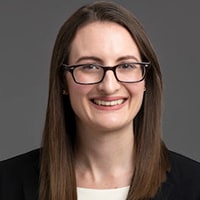Conference MDAngle offers personal perspectives from conference attendees, showcasing their anticipation, quick takeaways, and insights into how the presented research will impact their patients.
The ACTRIMS Forum 2025 was held in West Palm Beach, Florida, from February 27 to March 1. This dynamic meeting offered networking opportunities, poster sessions, and industry showcases, all designed to inspire and connect professionals in the MS community. This year’s meeting highlighted new data on the use of BTK inhibitors to reduce disability accumulation and slow associated progression to more severe MS phenotypes. Exploratory research on the use of CAR T-cell therapy for patients with MS was also presented, including safety profile data, along with fresh perspectives on aging and MS.

Annalisa Morgan, MD
Clinical Fellow, Yale School of Medicine, New Haven, Connecticut
“ACTRIMS 2025 brought us a lot of new, exciting data to consider as we continue to optimize our care of patients with MS. And I'm looking forward to more information being presented in future based on ongoing research.”
Preconference Considerations
ACTRIMS 2025: Anticipating New Directions in DMTs for RRMS
Dr Morgan looks forward to the 2025 ACTRIMS Forum, where discussions will focus on DMTs for patients with an inflammatory relapsing-remitting phenotype of MS. Key topics will include debates on MS subtypes, the potential of new treatments such as CAR T-cell therapy, and the ongoing development of BTK inhibitors and anti-CD40 ligand therapies. The meeting will also address aging in patients with MS, particularly regarding the safety and effectiveness of DMTs in older individuals.
Quick Clinical Takeaways
ACTRIMS 2025: Promising Advances and New Prospects in DMTs for RRMS
Dr Morgan shares updates from ACTRIMS 2025 on DMTs for relapsing-remitting MS, such as promising results with BTK inhibitors such as tolebrutinib, which reduced the risk for disability worsening, especially in patients with higher numbers of paramagnetic rim lesions. Research also suggested that BTK inhibitors could prevent progressive disease features, such as cortical demyelination, in experimental models. Additionally, CAR T-cell therapy, still under investigation, showed potential for B-cell depletion in MS patients but carries such risks as cytokine release syndrome and lymphodepletion.
How Will My Patients Benefit?
ACTRIMS 2025: Clinical Impact of New DMT Data in RRMS
Dr Morgan discusses incorporating new treatments from the 2025 ACTRIMS Forum into her clinical practice, particularly CAR T-cell therapy for younger, less disabled patients with breakthrough RRMS, though more research is needed. She is cautious about using the BTK inhibitor tolebrutinib for active MS but sees potential in patients with secondary progressive MS and higher paramagnetic rim lesions. Dr Morgan also emphasizes the need for further studies to standardize extended-interval dosing of ocrelizumab, particularly for older patients or those at higher risk of infections.
Polling Question
Summary
The 2025 ACTRIMS Forum provided exciting and inspiring presentations on research into the therapeutic advances in MS. In three videos, Dr Morgan explored emerging therapies for RRMS. She highlighted promising data on BTK inhibitors, which may reduce disability progression, particularly in patients with paramagnetic rim lesions. Additionally, Dr Morgan discussed CAR T-cell therapy’s potential for B-cell depletion in MS, though safety concerns remain. She also emphasized the need for further research to refine treatment strategies, including extended-interval dosing for older patients or those at higher infection risk.









